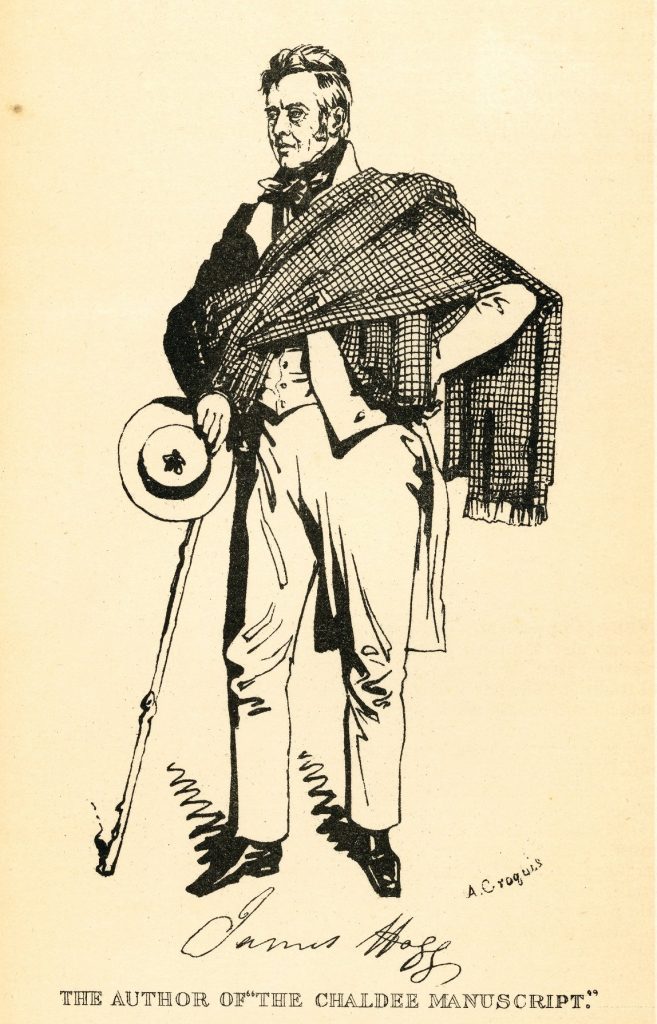To mark the 250th anniversary of the birth of James Hogg (1770-1835), we are featuring a peculiarly timely manuscript from Edinburgh University Library’s collections. Hogg’s poem ‘1831’ will strike a familiar chord with readers in 2020. It bids a hearty good riddance to a year plagued by a rampant epidemic, public unrest, conspiracy theories, and disruption to work and trade.
The poem’s refrain damns 1831 as the accursed year of ‘Burking, Bill, and Cholera’. The first major 19th-century outbreak of cholera reached Northern England in late summer 1831, probably via ships bringing imports from India. By the end of the year, it had entered Scotland, where it spread rapidly through the growing industrial towns, killing over 9,500 people. The disease also caused massive unemployment, particularly among weavers, as the demand for their wares plummeted. Quarantine regulations further prevented hawkers and travelling salesmen from travelling between towns. Economic deprivation led to ‘cholera riots’ in Glasgow, Edinburgh, and Paisley. The target of the rioters’ fury was the medical profession which was suspected of Burking cholera patients. This term alluded to the body-snatching spree of Burke and Hare, crimes fresh in the public memory. It implied that doctors were systematically murdering cholera-sufferers to meet the demand for anatomic specimens.
Some protesters also claimed that the British government was deliberately spreading cholera in order to thin the numbers of the politically troublesome working classes. By ‘Bill’, Hogg means the Reform Bill of 1831, which envisaged a huge expansion of the (male) electorate. The rejection of the Bill by the House of Lords led to a nationwide outbreak of popular violence. Rioters set fire to Nottingham Castle (hence Hogg’s references to ‘flames’ and ‘fumes’) and seized control of Bristol for three days. Suspicion that cholera was being used to suppress the working classes blurred the boundaries between ‘Reform riots’ and ‘Cholera riots’.
Hogg’s essentially humorous poem is built around a series of outrageous run-on rhymes where ‘cholera’ is made to rhyme with ‘intolera(ble)’, ‘follower a’, ‘hollower a’ ‘scholar a’, ‘roller a’, and ‘polar a’. The poet imagines a reader upbraiding him for ‘impiously’ laughing at ‘flames and death’ but protests that he merely longs to see an end to ‘drivelling without end | ‘Bout Burking, Bill, and Cholera!’. Although a man of the people himself, Hogg was, in fact, no friend to the Reformers.
See below for the two-page manuscript ((Dc.4.101-103), which Hogg signs with his literary soubriquet ‘The Ettrick Shepherd’:

‘1831’ by James Hogg (Dc.4.101-103)
Transcript (page 1)
1831 by the Ettrick Shepherd
O Eighteen hundred thirty one
Thou hast been an intolera-
Ble year for fume, for fudge, and flame
For Burking and for cholera
I’m glad that some thine end hast seen;
And may heaven make thy follower a
Better year than thou thou hast been
With thy fumes, bill, and cholera
“Hold, Shepherd! Hold thy impious breath!
It would be most intolera-
Ble thus to laugh at flames and death
At Burking and at cholera!”
Alas! I neither laugh nor flout
Nor give my tongue a tolera-
Tion either to deride or scout
The burking, bill, or cholera
I only pray this year may send
To chief, to hind, to scholar a
Relief to drivelling without end
‘Bout burking, bill, and cholera

Transcript (page 2)
For all the years that I have seen,
A heartlesser and hollower a
Year than thou has never been,
With burking, bill, and cholera
Farewell, farewell! I see a storm
A rapper and a roller, a-
Pproaching so fiercely ‘bout Reform—
Twill burke both bill and cholera
Farewell, farewell! God speed thy flight
Far o’er the regions polar a
Long farewell to thee—jade outright
Thy burking, bill, and cholera
‘1831’ may well have been written during Hogg’s sole visit to London (late December 1831 to late March 1832), or possibly during the interminable one-week boat-trip that took him there from Edinburgh. Hogg had travelled to London to arrange for the publication of his collected fiction by the emerging publisher James Cochrane. This project, which Hogg hoped would offer financial security to his young family, was destined to fail when Cochrane was bankrupted shortly after the appearance of the first volume. During his three-month stay in the capital, Scott was feted by both high society and the literary world. ‘1831’ was published in the February 1832 edition of Fraser’s Magazine, which also featured a humorous account of the public celebration of Hogg’s ‘official’ birthday on 25 January. (Hogg’s date of birth is unknown. He was baptized on 9 December 1770 but may have been born up to three weeks earlier. He chose 25 January as his official birthday so as to share the date with another peasant-poet, Robert Burns.) The account is accompanied by a portrait by Daniel Maclise, where Hogg is wrapped in his characteristic shepherd’s plaid, but otherwise cuts a more distinguished figure than in previous portraits, where he depicted as either a dreaming rustic or a drunken buffoon.

James Hogg, by Daniel Maclise (Corson P.1703)
For further images of Hogg, see Edinburgh University Library’s Walter Scott Image Collection.
For further manuscript holdings of James Hogg in Edinburgh University Library, see a new resource on our ‘Scottish Literary Papers’ site.
Further Reading
- Mary Gray Hogg Garden, Memorials of James Hogg, the Ettrick Shepherd (Paisley: A. Gardner, 1885).
Peter Garside, ‘Hogg and the Book Trade’, in The Edinburgh Companion to James Hogg, ed. Ian Duncan and Douglas S. Mack (Edinburgh: Edinburgh University Press, 2012), pp. 21-30.
Gillian Hughes, ‘A Celebrity Sketch by Daniel Maclise’, Yale University Library Gazette, vol. 77, no. 1/2 (October 2002), pp. 86-90.
R. J. Morris, Cholera, 1832: The Social Response to an Epidemic (London: Croom Helm, 1976).
Eoin Shaloo, ‘An Unwelcome Visitor’, Discover (National Library of Scotland), issue 4 (2007), p. 15.
Paul Barnaby, Scottish Literary Collections Curator